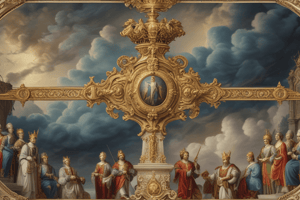Podcast
Questions and Answers
What characterizes Enlightened Absolutism?
What characterizes Enlightened Absolutism?
- Monarchs applying Enlightenment ideals while keeping absolute authority (correct)
- Socialism in governance
- Total disregard for Enlightenment principles
- Complete democratic governance
Who were some key rulers of Enlightened Absolutism?
Who were some key rulers of Enlightened Absolutism?
Frederick the Great, Catherine the Great, Austrian Habsburgs
What were some enlightened policies implemented by Frederick the Great?
What were some enlightened policies implemented by Frederick the Great?
Freedom of religion, simplification of laws, improvements in education
Catherine the Great was known for supporting serfdom in Russia.
Catherine the Great was known for supporting serfdom in Russia.
What were Catherine the Great's three main goals?
What were Catherine the Great's three main goals?
What reforms did Maria Theresa introduce following the War of Austrian Succession?
What reforms did Maria Theresa introduce following the War of Austrian Succession?
Joseph II abolished serfdom and was widely accepted by both nobility and peasants.
Joseph II abolished serfdom and was widely accepted by both nobility and peasants.
What legacy did Enlightened Absolutism leave regarding social justice?
What legacy did Enlightened Absolutism leave regarding social justice?
Flashcards
Enlightened Absolutism
Enlightened Absolutism
Monarch's use of Enlightenment ideals while maintaining absolute power.
Frederick the Great's Policies
Frederick the Great's Policies
Encouraged religious freedom, improved education, and reformed the legal system, but maintained serfdom.
Catherine the Great's Westernization
Catherine the Great's Westernization
Inviting Western architects and thinkers to modernize Russia.
Catherine the Great's Domestic Reforms
Catherine the Great's Domestic Reforms
Signup and view all the flashcards
Maria Theresa's Reforms
Maria Theresa's Reforms
Signup and view all the flashcards
Joseph II's Serfdom Reforms
Joseph II's Serfdom Reforms
Signup and view all the flashcards
Enlightened Absolutism's Shortcomings
Enlightened Absolutism's Shortcomings
Signup and view all the flashcards
Enlightenment Philosophers' Oversights
Enlightenment Philosophers' Oversights
Signup and view all the flashcards
Study Notes
Enlightened Absolutism
- Monarchs adopted Enlightenment ideals while maintaining absolute power.
- Key figures include Frederick the Great (Prussia), Catherine the Great (Russia), and the Austrian Habsburgs (Austria).
Frederick the Great
- Prussian ruler in the 18th century known for military successes.
- Key conflicts:
- European War of Austrian Succession: expanded territory by taking Silesia and doubling population.
- Seven Years' War: successfully defended against Austria and France.
- Instituted enlightened policies post-war:
- Encouraged freedom of religion and philosophical thought.
- Advanced education and improved schools; welcomed scholarly publications.
- Simplified laws, eliminated torture, and ensured fair judicial processes.
- Promoted agricultural and industrial reconstruction.
- Maintained absolutism:
- Continued serfdom and didn't emancipate serfs on his estates.
- Privileged the nobility, crucial for the military's support.
- Imposed restrictions on Jews, relegating them to ghettos and limiting their rights.
Catherine the Great
- Ascended to the throne at 15 after overthrowing Peter III.
- Goals included:
- Westernization of Russia: invited western architects and collaborated with Enlightenment thinkers like Voltaire.
- Domestic reforms: restricted torture, allowed limited religious freedom, improved education, and strengthened local governance.
- Territorial expansion: partitioned Poland among Russia, Prussia, and Austria after military successes.
- Absolute rule characterized by oppressive serfdom:
- Pugachev's Rebellion led to intensified control over serfs.
- Nobility received extensive privileges, exempting them from taxes and state service.
Austrian Habsburgs
- Maria Theresa aimed to strengthen the state post-War of Austrian Succession, focusing on:
- Reducing papal political influence through legislative measures.
- Administrative reforms to enhance the central bureaucracy and tax efficiency.
- Improving conditions for the agricultural population by limiting lord control over serfs.
- Joseph II:
- Abolished serfdom and mandated cash payment for peasant labor.
- Reforms faced backlash from both nobility and peasants due to lack of cash resources.
Legacy of Enlightened Absolutism
- Rulers blended traditional state-building with Enlightenment culture and thought.
- Failure to abolish serfdom highlights shortcomings in Enlightenment ideals concerning equality and social justice.
- Several Enlightenment philosophers overlooked the oppressive policies of eastern absolutists, revealing a gap in contemporary critical thinking.
Studying That Suits You
Use AI to generate personalized quizzes and flashcards to suit your learning preferences.




